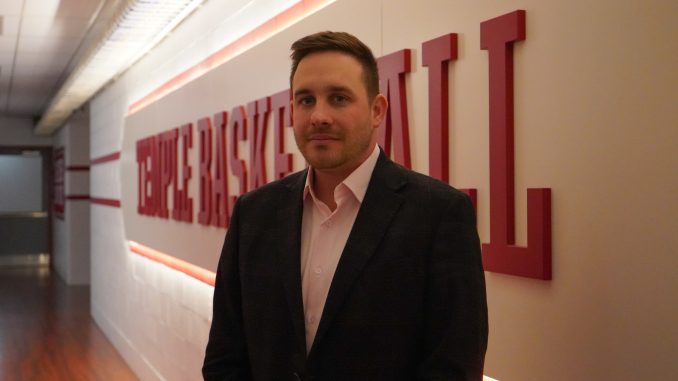
For Temple’s Edward Darrah, mental health challenges helped shape his resiliency today. Whether it was being cut from Neumann University’s baseball team in 2006 or showing up to his athlete performance practice in Spring 2016 with only one client on his list, Darrah has experienced some pretty low moments in his life.
None were lower than when he heard life-threatening news in August 2015.
“I was diagnosed with a brain tumor in 2015,” Darrah said. “I got diagnosed with craniopharyngioma.”
Darrah has never spoken publicly about his noncancerous tumor that nearly cost him eyesight and permanent brain damage, but he still uses it as a personal lesson for how to overcome adversity. The trauma forced him to find ways to stay motivated, and he now puts that same faith into every client he sees as Temple Athletics’ director of mental health counseling.
Darrah focuses on performance and life-based care for Temple athletes who are either recommended or opt to see him. Darrah and his staff aim to provide athletes with “wellness techniques” instead of strictly performance-based ideas. For instance, they strive to help athletes manage the impact of injuries on their personal lives instead of solely focusing on how injuries affect their quality of play.
“Educating an athlete about what they’re experiencing is very important,” Darrah said. “We can tailor a treatment plan that both addresses their needs athletically but most importantly their quality of wellness.”
Darrah has taken counselors under his wing at Temple, especially Melissa Graham, a mental health counselor within the department. Graham, who formerly ran track at Towson University, has seen the level of care Darrah has for his patients and profession.
“He’s somebody that I’ll always view as a mentor,” Graham said. “He’ll always be somebody I’ll reach out to if I have questions.”
By understanding people are more than their positions on the field, Darrah has found a niche within sports psychology. He knows that college athletes, while talented, are still human at the end of the day.
Outside of the workplace, though, Darrah has his own counselor to seek his own help. Supporting others can be difficult if you don’t always support yourself, Darrah said.
“The biggest differentiator between performance and mental health is that it’s only specific towards performance,” Darrah said. “When we talk about performance anxiety that means it’s only focused on one part of their life.”
Graham’s performance anxiety is what brought her into the field of mental health counseling, but it is Darrah’s innovations for wellness, like using Blueprint, a digital platform that can measure a person’s behavioral health through daily and weekly questionnaires, that has kept her working under Darrah. She has enjoyed the exciting projects he has in store.
Darrah will also be creating a Wiki page where Temple Athletes can access resources that educate them on different coping mechanisms, Graham said.
Both Blueprint and Wikipedia pages have been effective for those suffering from mental problems, but it is just another facet of Darrah’s modernized approach to mental well-being.
“For those to be things that students can access easily, the folks that we are working with can have that kind of access to, it’s been really important,” said Jordan Campbell, an intern within Temple Athletics. “I think that it speaks to [Ed’s] character, his passion, his willingness to take on these extra projects that can be more time consuming.”
So when Darrah gained 100 pounds after the 15-hour surgery that removed his craniopharyngioma, he knew he needed to put his practice on hold as he took care of his own well-being. Today, Darrah can give his undivided attention to his clients when in the workplace.
As Darrah entered the operating room in August 2015, he did not know that he would exit the surgery a stronger person than he was entering it.
Temple’s director of mental health counseling has, in fact, helped save countless others from depressive episodes and other mental traumas. When Darrah relied on the professionals around him, they were there for him, so he makes sure he is there for his student athletes now.
“Athlete wellness is helping the athlete cope with some of the stress that occurs from sport or occurs from external avenues,” Darrah said. “The avenues that is impacting large parts of their life.”


Be the first to comment